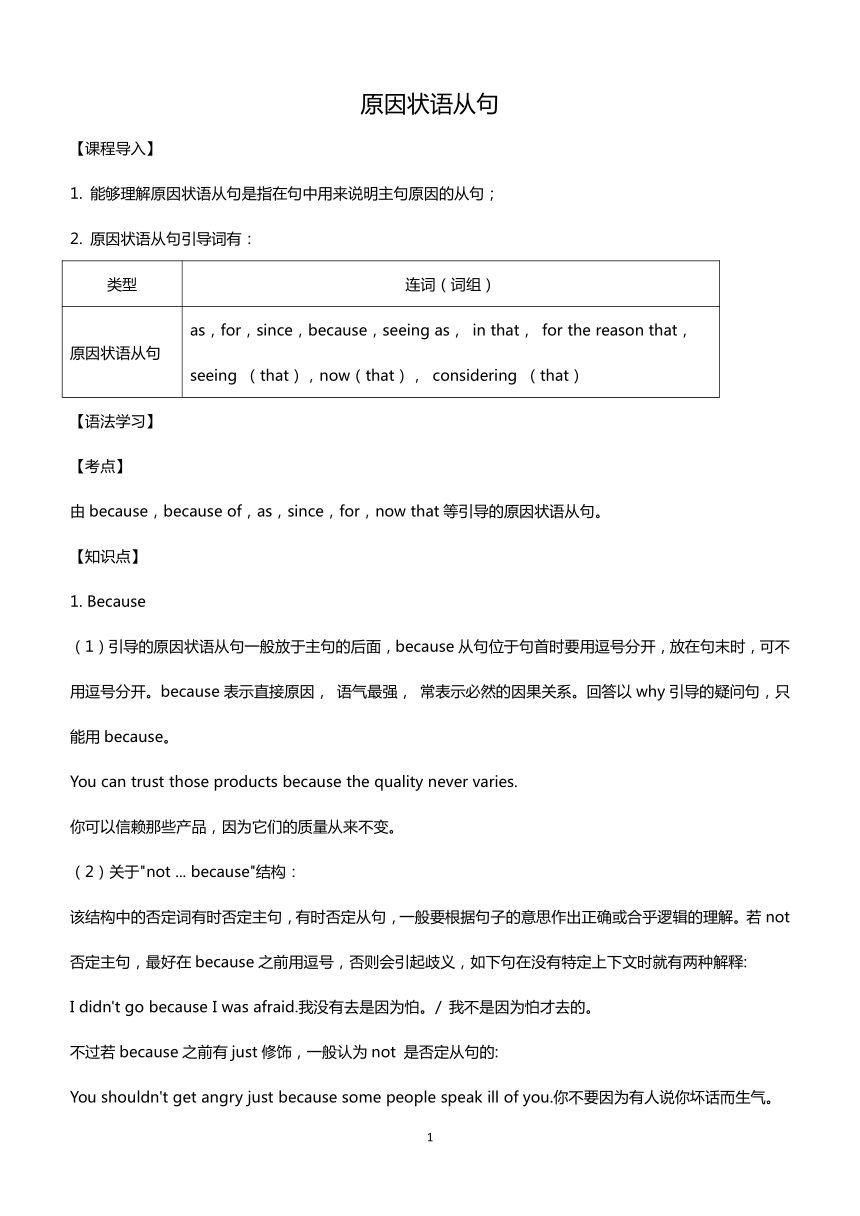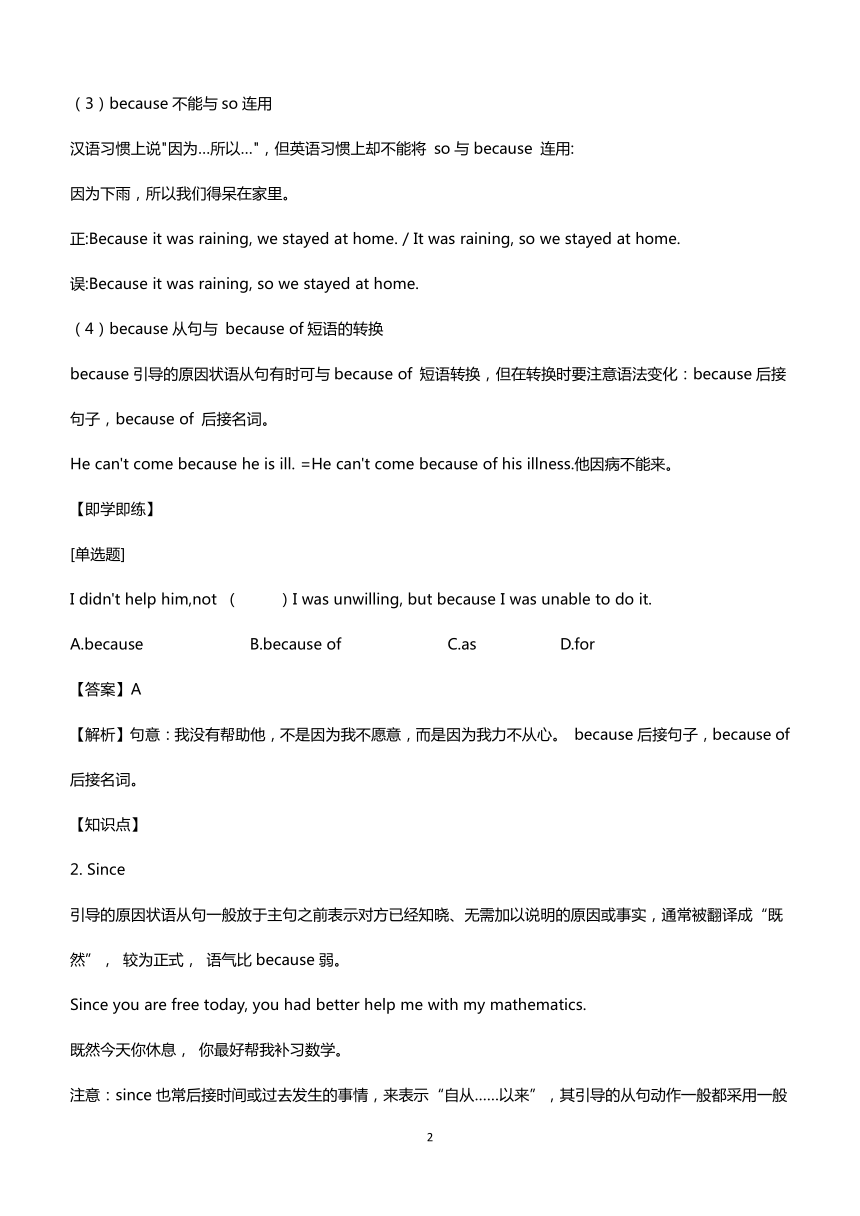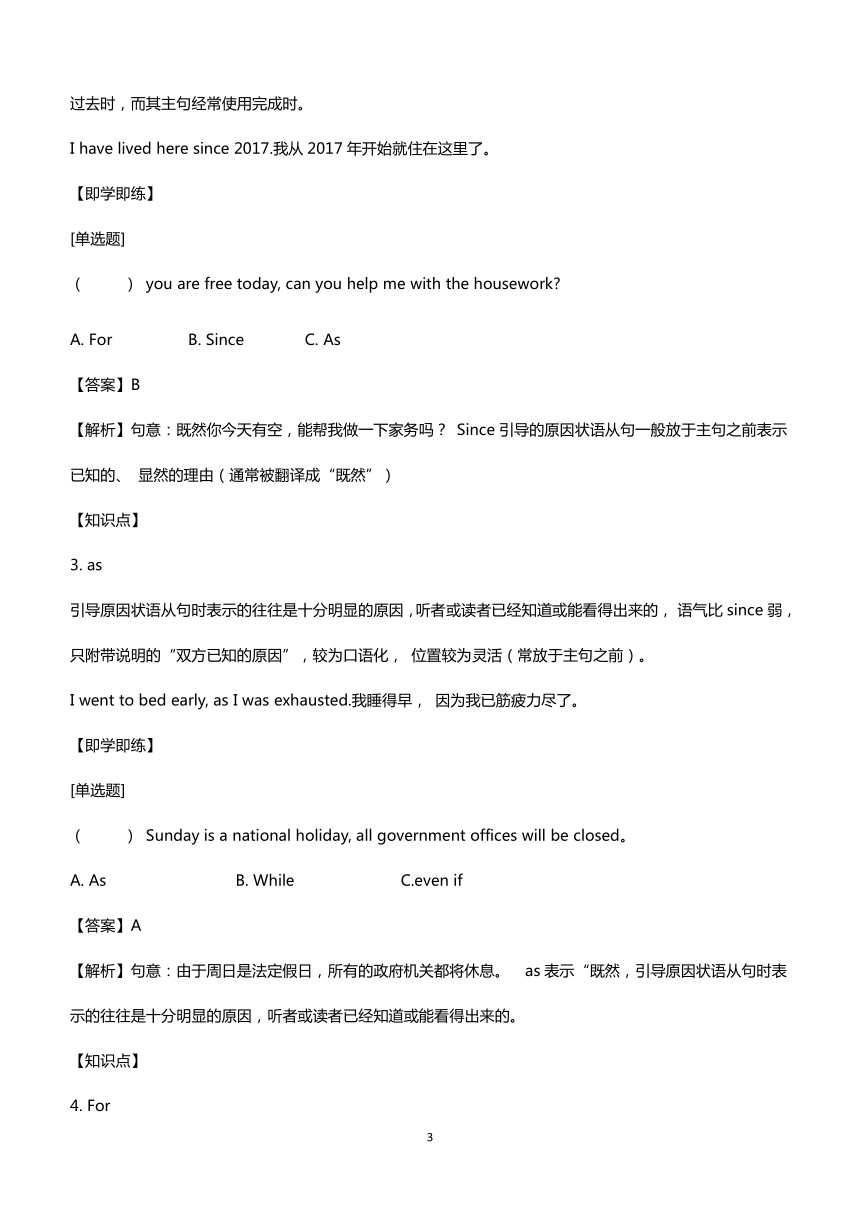初中语法知识点_lesson50原因状语从句 学案
文档属性
| 名称 | 初中语法知识点_lesson50原因状语从句 学案 |

|
|
| 格式 | docx | ||
| 文件大小 | 24.6KB | ||
| 资源类型 | 试卷 | ||
| 版本资源 | 通用版 | ||
| 科目 | 英语 | ||
| 更新时间 | 2021-08-18 14:06:06 | ||
图片预览



文档简介
原因状语从句
【课程导入】
1. 能够理解原因状语从句是指在句中用来说明主句原因的从句;
2. 原因状语从句引导词有:
类型
连词(词组)
原因状语从句
as,for,since,because,seeing as, in that, for the reason that,
seeing (that),now(that), considering (that)
【语法学习】
【考点】
由because,because of,as,since,for,now that等引导的原因状语从句。
【知识点】
1. Because
(1)引导的原因状语从句一般放于主句的后面,because从句位于句首时要用逗号分开,放在句末时,可不用逗号分开。because表示直接原因, 语气最强, 常表示必然的因果关系。回答以why引导的疑问句,只能用because。
You can trust those products because the quality never varies.
你可以信赖那些产品,因为它们的质量从来不变。
(2)关于"not ... because"结构:
该结构中的否定词有时否定主句,有时否定从句,一般要根据句子的意思作出正确或合乎逻辑的理解。若not否定主句,最好在because之前用逗号,否则会引起歧义,如下句在没有特定上下文时就有两种解释:
I didn't go because I was afraid.我没有去是因为怕。/ 我不是因为怕才去的。
不过若because之前有just修饰,一般认为not 是否定从句的:
You shouldn't get angry just because some people speak ill of you.你不要因为有人说你坏话而生气。
(3)because不能与so连用
汉语习惯上说"因为…所以…",但英语习惯上却不能将 so与because 连用:
因为下雨,所以我们得呆在家里。
正:Because it was raining, we stayed at home. / It was raining, so we stayed at home.
误:Because it was raining, so we stayed at home.
(4)because从句与 because of短语的转换
because引导的原因状语从句有时可与because of 短语转换,但在转换时要注意语法变化:because后接句子,because of 后接名词。
He can't come because he is ill. =He can't come because of his illness.他因病不能来。
【即学即练】
[单选题]
I didn't help him,not ( )I was unwilling, but because I was unable to do it.
A.because B.because of C.as D.for
【答案】A
【解析】句意:我没有帮助他,不是因为我不愿意,而是因为我力不从心。 because后接句子,because of 后接名词。
【知识点】
2. Since
引导的原因状语从句一般放于主句之前表示对方已经知晓、无需加以说明的原因或事实,通常被翻译成“既然”, 较为正式, 语气比because弱。
Since you are free today, you had better help me with my mathematics.
既然今天你休息, 你最好帮我补习数学。
注意:since也常后接时间或过去发生的事情,来表示“自从……以来”,其引导的从句动作一般都采用一般过去时,而其主句经常使用完成时。
I have lived here since 2017.我从2017年开始就住在这里了。
【即学即练】
[单选题]
( ) you are free today, can you help me with the housework?
A. For B. Since C. As
【答案】B
【解析】句意:既然你今天有空,能帮我做一下家务吗? Since引导的原因状语从句一般放于主句之前表示已知的、 显然的理由(通常被翻译成“既然”)
【知识点】
3. as
引导原因状语从句时表示的往往是十分明显的原因,听者或读者已经知道或能看得出来的, 语气比since弱,只附带说明的“双方已知的原因”,较为口语化, 位置较为灵活(常放于主句之前)。
I went to bed early, as I was exhausted.我睡得早, 因为我已筋疲力尽了。
【即学即练】
[单选题]
( ) Sunday is a national holiday, all government offices will be closed。
A. As B. While C.even if
【答案】A
【解析】句意:由于周日是法定假日,所有的政府机关都将休息。 as表示“既然,引导原因状语从句时表示的往往是十分明显的原因,听者或读者已经知道或能看得出来的。
【知识点】
4. For
引导的是并列句表示原因但并不说明主句行为发生的直接原因, 只提供一些辅助性的补充说明, for引导的并列句只能放于主句之后并且必须用逗号将其与主句隔开。
He could not have seen me, for I was not there. 他不可能见过我, 因为我不在那里。
【即学即练】
[单选题]
It must have rained last night, ( )the street is wet all over.
A. because of B.which C. for
【答案】C
【解析】句意:昨晚肯定下雨了,因为街道都湿了。 主句猜测昨天晚上肯定下雨了,理由是街道都湿了,但是街道湿了不一定是下雨了,也有可能是洒水车洒的,所以主从句不构成直接的因果关系,所以选for。
【知识点】
5. 比较:because, since,as和for的区别:
一、because
(1)位置:一般放于主句的后面,because从句位于句首时要用逗号分开,放在句末时,可不用逗号分开。
(2)because表示直接原因, 语气最强, 最适合回答why引导的疑问句。
(3)because of 也表示原因,后面只能接名词/代词/动名词。
(4)because 和so 不可连用。
We went by bus because it was cheaper.
= It was cheaper so we went by bus.
我们坐公交车去是因为它便宜。
He can't go to school because of his illness.
他没去上学是因为生病了。
二、since
(1)位置:一般放于主句之前,表示已知的、 显然的理由(通常被翻译成"既然"= now that )。
(2)较为正式, 语气比because弱。
Since you are free today, you had better help me with my mathematics.
既然今天你休息, 你最好帮我补习数学。
三、as
(1)位置:位置较为灵活(常放于主句之前)。
(2)as 引导原因状语从句时表示附带说明的“双方已知的原因”,含有对比说明的意味。
(3)语气比since弱,较口语化。
I went to bed early, as I was exhausted.
我睡得早, 因为我已筋疲力尽了。
四、for
(1)位置:只能放于主句之后并且必须用逗号将其与主句隔开。
(2)表示原因但并不说明主句行为发生的直接原因, 只提供一些辅助性的补充说明。
He could not have seen me, for I was not there.
He seldom goes out now, for he is very old.
As和for引导的主、从句,二者处于平等位置。
Because引导的从句显得比主句重要,强调原因。
Since引导的从句显得次要,而主句重要,以说明将要做什么事。
【即学即练】
[单选题]
( )you insist,I’ll go.
A. However B. Since C. For D. Because of
【答案】B
【解析】 既然你坚持,那我就去。 since引导的原因状语从句一般放于主句之前,表示已知的、 显然的理由"既然"。
【知识点】
6. 用介词表示因果关系
常用的介词有:because of,due to,owing to。因为是介词,所以它们的后面只能接名词而不是从句。
Owing to his carelessness we had an accident. 由于他的粗心大意,我们出了车祸。
【即学即练】
[单选题]
we had an accident ( )his carelessness.
A.because B.as C.due to D.since
【答案】C
【解析】 由于他的粗心大意,我们出了车祸。 due to是介词,后面接名词,because 后接句子。
【知识点】
7. 其他复合连词表示原因
(1) in that
其基本意思是“原因就在于”,其引导的从句一般情况下放在主句后面,而且主句通常是在作比较。
Mercury differs from other industrial metals in that it is a liquid.水银不同于其他种类的工业用金属,原因就在于它是液态的。
(2) seeing (that), now (that), considering (that),given that
seeing (that), now (that), considering (that), given that这些连词与since相似, 都表示"既然"“鉴于某个事实,考虑到”的意思。
Seeing (that) he refused to help us, there's no reason that we should now help him.
他既然曾经拒绝帮助我们, 我们没有理由要来帮助他。
【即学即练】
[单选题]
( )everybody is here, let's begin our discussion.
A. Considering that B. As C. Because of D. For
【答案】A
【解析】 既然大家都到了, 我们就开始讨论吧。 Considering that表示"既然"“鉴于某个事实,考虑到”。
【知识点】
8. not that……but that……引导原因状语从句,意为“不是因为,而是因为”,是一种加强语气的表示原因的结构
The soldier’s essential honor was not that he killed his enemy, but that he was willing to die.军人的真正光荣不是杀敌,而是不惜牺牲。
【即学即练】
[单选题]
Not ( )I don’t like the film,( )that I have no time for it.
A. that; / B.that; which C.that; but D. /; but
【答案】C
【解析】 不是因为我不喜欢这部电影,而是因为我没时间看。 not that……but that……引导原因状语从句,意为“不是因为,而是因为”。
【课程导入】
1. 能够理解原因状语从句是指在句中用来说明主句原因的从句;
2. 原因状语从句引导词有:
类型
连词(词组)
原因状语从句
as,for,since,because,seeing as, in that, for the reason that,
seeing (that),now(that), considering (that)
【语法学习】
【考点】
由because,because of,as,since,for,now that等引导的原因状语从句。
【知识点】
1. Because
(1)引导的原因状语从句一般放于主句的后面,because从句位于句首时要用逗号分开,放在句末时,可不用逗号分开。because表示直接原因, 语气最强, 常表示必然的因果关系。回答以why引导的疑问句,只能用because。
You can trust those products because the quality never varies.
你可以信赖那些产品,因为它们的质量从来不变。
(2)关于"not ... because"结构:
该结构中的否定词有时否定主句,有时否定从句,一般要根据句子的意思作出正确或合乎逻辑的理解。若not否定主句,最好在because之前用逗号,否则会引起歧义,如下句在没有特定上下文时就有两种解释:
I didn't go because I was afraid.我没有去是因为怕。/ 我不是因为怕才去的。
不过若because之前有just修饰,一般认为not 是否定从句的:
You shouldn't get angry just because some people speak ill of you.你不要因为有人说你坏话而生气。
(3)because不能与so连用
汉语习惯上说"因为…所以…",但英语习惯上却不能将 so与because 连用:
因为下雨,所以我们得呆在家里。
正:Because it was raining, we stayed at home. / It was raining, so we stayed at home.
误:Because it was raining, so we stayed at home.
(4)because从句与 because of短语的转换
because引导的原因状语从句有时可与because of 短语转换,但在转换时要注意语法变化:because后接句子,because of 后接名词。
He can't come because he is ill. =He can't come because of his illness.他因病不能来。
【即学即练】
[单选题]
I didn't help him,not ( )I was unwilling, but because I was unable to do it.
A.because B.because of C.as D.for
【答案】A
【解析】句意:我没有帮助他,不是因为我不愿意,而是因为我力不从心。 because后接句子,because of 后接名词。
【知识点】
2. Since
引导的原因状语从句一般放于主句之前表示对方已经知晓、无需加以说明的原因或事实,通常被翻译成“既然”, 较为正式, 语气比because弱。
Since you are free today, you had better help me with my mathematics.
既然今天你休息, 你最好帮我补习数学。
注意:since也常后接时间或过去发生的事情,来表示“自从……以来”,其引导的从句动作一般都采用一般过去时,而其主句经常使用完成时。
I have lived here since 2017.我从2017年开始就住在这里了。
【即学即练】
[单选题]
( ) you are free today, can you help me with the housework?
A. For B. Since C. As
【答案】B
【解析】句意:既然你今天有空,能帮我做一下家务吗? Since引导的原因状语从句一般放于主句之前表示已知的、 显然的理由(通常被翻译成“既然”)
【知识点】
3. as
引导原因状语从句时表示的往往是十分明显的原因,听者或读者已经知道或能看得出来的, 语气比since弱,只附带说明的“双方已知的原因”,较为口语化, 位置较为灵活(常放于主句之前)。
I went to bed early, as I was exhausted.我睡得早, 因为我已筋疲力尽了。
【即学即练】
[单选题]
( ) Sunday is a national holiday, all government offices will be closed。
A. As B. While C.even if
【答案】A
【解析】句意:由于周日是法定假日,所有的政府机关都将休息。 as表示“既然,引导原因状语从句时表示的往往是十分明显的原因,听者或读者已经知道或能看得出来的。
【知识点】
4. For
引导的是并列句表示原因但并不说明主句行为发生的直接原因, 只提供一些辅助性的补充说明, for引导的并列句只能放于主句之后并且必须用逗号将其与主句隔开。
He could not have seen me, for I was not there. 他不可能见过我, 因为我不在那里。
【即学即练】
[单选题]
It must have rained last night, ( )the street is wet all over.
A. because of B.which C. for
【答案】C
【解析】句意:昨晚肯定下雨了,因为街道都湿了。 主句猜测昨天晚上肯定下雨了,理由是街道都湿了,但是街道湿了不一定是下雨了,也有可能是洒水车洒的,所以主从句不构成直接的因果关系,所以选for。
【知识点】
5. 比较:because, since,as和for的区别:
一、because
(1)位置:一般放于主句的后面,because从句位于句首时要用逗号分开,放在句末时,可不用逗号分开。
(2)because表示直接原因, 语气最强, 最适合回答why引导的疑问句。
(3)because of 也表示原因,后面只能接名词/代词/动名词。
(4)because 和so 不可连用。
We went by bus because it was cheaper.
= It was cheaper so we went by bus.
我们坐公交车去是因为它便宜。
He can't go to school because of his illness.
他没去上学是因为生病了。
二、since
(1)位置:一般放于主句之前,表示已知的、 显然的理由(通常被翻译成"既然"= now that )。
(2)较为正式, 语气比because弱。
Since you are free today, you had better help me with my mathematics.
既然今天你休息, 你最好帮我补习数学。
三、as
(1)位置:位置较为灵活(常放于主句之前)。
(2)as 引导原因状语从句时表示附带说明的“双方已知的原因”,含有对比说明的意味。
(3)语气比since弱,较口语化。
I went to bed early, as I was exhausted.
我睡得早, 因为我已筋疲力尽了。
四、for
(1)位置:只能放于主句之后并且必须用逗号将其与主句隔开。
(2)表示原因但并不说明主句行为发生的直接原因, 只提供一些辅助性的补充说明。
He could not have seen me, for I was not there.
He seldom goes out now, for he is very old.
As和for引导的主、从句,二者处于平等位置。
Because引导的从句显得比主句重要,强调原因。
Since引导的从句显得次要,而主句重要,以说明将要做什么事。
【即学即练】
[单选题]
( )you insist,I’ll go.
A. However B. Since C. For D. Because of
【答案】B
【解析】 既然你坚持,那我就去。 since引导的原因状语从句一般放于主句之前,表示已知的、 显然的理由"既然"。
【知识点】
6. 用介词表示因果关系
常用的介词有:because of,due to,owing to。因为是介词,所以它们的后面只能接名词而不是从句。
Owing to his carelessness we had an accident. 由于他的粗心大意,我们出了车祸。
【即学即练】
[单选题]
we had an accident ( )his carelessness.
A.because B.as C.due to D.since
【答案】C
【解析】 由于他的粗心大意,我们出了车祸。 due to是介词,后面接名词,because 后接句子。
【知识点】
7. 其他复合连词表示原因
(1) in that
其基本意思是“原因就在于”,其引导的从句一般情况下放在主句后面,而且主句通常是在作比较。
Mercury differs from other industrial metals in that it is a liquid.水银不同于其他种类的工业用金属,原因就在于它是液态的。
(2) seeing (that), now (that), considering (that),given that
seeing (that), now (that), considering (that), given that这些连词与since相似, 都表示"既然"“鉴于某个事实,考虑到”的意思。
Seeing (that) he refused to help us, there's no reason that we should now help him.
他既然曾经拒绝帮助我们, 我们没有理由要来帮助他。
【即学即练】
[单选题]
( )everybody is here, let's begin our discussion.
A. Considering that B. As C. Because of D. For
【答案】A
【解析】 既然大家都到了, 我们就开始讨论吧。 Considering that表示"既然"“鉴于某个事实,考虑到”。
【知识点】
8. not that……but that……引导原因状语从句,意为“不是因为,而是因为”,是一种加强语气的表示原因的结构
The soldier’s essential honor was not that he killed his enemy, but that he was willing to die.军人的真正光荣不是杀敌,而是不惜牺牲。
【即学即练】
[单选题]
Not ( )I don’t like the film,( )that I have no time for it.
A. that; / B.that; which C.that; but D. /; but
【答案】C
【解析】 不是因为我不喜欢这部电影,而是因为我没时间看。 not that……but that……引导原因状语从句,意为“不是因为,而是因为”。
同课章节目录
- 词法
- 名词
- 动词和动词短语
- 动词语态
- 动词时态
- 助动词和情态动词
- 非谓语动词
- 冠词
- 代词
- 数词和量词
- 形容词副词及其比较等级
- 介词和介词短语
- 连词和感叹词
- 构词法
- 相似、相近词比较
- 句法
- 陈述句
- 一般疑问句和否定疑问句
- 特殊疑问句及选择疑问句
- 反意疑问句
- 存在句(There be句型)
- 宾语从句
- 定语从句
- 状语从句
- 主谓一致问题
- 简单句
- 并列句
- 复合句
- 主谓一致
- 主、表语从句
- 名词性从句
- 直接引语和间接引语
- 虚拟语气
- 感叹句
- 强调句
- 倒装句
- 祈使句
- 句子的成分
- 句子的分类
- 题型专区
- 单项选择部分
- 易错题
- 完形填空
- 阅读理解
- 词汇练习
- 听说训练
- 句型转换
- 补全对话
- 短文改错
- 翻译
- 书面表达
- 任务型阅读
- 语法填空
- 其他资料
